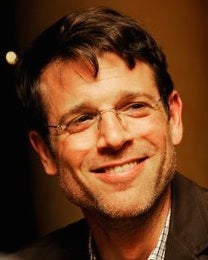By Shana Melnysyn
Dr. Alex Gardner is the Executive Director and Chief Editor for The Treasury of Lives, a digital humanities project that comprises “a biographical encyclopedia of Tibet, Inner Asia, and the Himalayan region.” Dr. Gardner received his PhD in Asian Languages and Cultures from University of Michigan in 2007.
Dr. Alex Gardner began his post-PhD career path with a stroke of luck. After finishing his doctorate in Buddhist Studies at University of Michigan, Dr. Gardner received a postdoc at the Tibetan Buddhist Resource Center (now the Buddhist Digital Resource Center). At the time, the Center was located in the Rubin Museum of Art in New York City. There, Dr. Gardner was able to work on cataloging and researching materials that were directly related to his doctoral research. Through this work, he met the Rubin family and their three-person staff. The Rubin Museum had an enormous collection of Himalayan art, but public awareness of this type of art was minimal. The Shelley and Donald Rubin Foundation was working on digital humanities projects, as well as pursuing grant-making for undergraduate education in Himalayan Studies, but did not have anyone on staff with extensive knowledge about the region. So they brought Dr. Gardner on to help with these projects. Gardner taught as an adjunct professor, in addition to working with a digital humanities project at the Rubin Foundation, before eventually coming on at the Foundation full time. He went on to serve as director for seven years, overseeing grants to six universities to promote knowledge of and interest in the Himalaya, including Emory, NYU, Columbia, The New School, Dartmouth, and Yale. Gardner also managed the Foundation’s grant making programs in Asia.

The digital humanities project that Dr. Gardner helped launch during his first years at the Foundation grew into The Treasury of Lives, which eventually became an independent 501(c)3. He now serves as the Executive Director for this digital humanities project, which publishes biographies of important historical figures in the history of Tibet and Tibetan Buddhism. The site currently features 1150 biographies written by 90 international scholars, and has become an important resource for anyone interested in these topics.
How did PhD training prepare him for what he does now?
When Alex Gardner was working on his PhD, professional development for doctoral students was not common. While the intellectual training he received at U of M was thorough and comprehensive, when it came time to tackle the academic job market, he realized he had to learn as he went along. He found it difficult not knowing what was coming next in each stage of his doctoral career. Back then, Gardner never had an inkling that there were other things one could do with a PhD that were not tenure track professor jobs.
The skills that Gardner says his PhD training did provide have been crucial to his professional success. He cites critical thinking, the ability to take in a massive amount of data, to see patterns, and to fashion a narrative and communicate ideas from this data as important abilities that are honed through doctoral research. Academic training teaches you to pull at strings to find the things that matter and have meaning and relevance. Dr. Gardner has been able to carry these skills into completely different contexts and fields. A business degree would not have prepared him in this way. The PhD’s ability to process information is special.
What would have been helpful additional training during his doctoral studies?
Since Dr. Gardner did not anticipate during graduate studies that he would someday be running a nonprofit, he had to learn a lot about his current nonprofit work “on the fly.” Taking a class in nonprofit management during his doctoral studies would have been very valuable, but he didn’t realize it while he was still in graduate school.
Gardner suggests holding formal or informal graduate student forums where students and faculty talk about issues affecting students across the humanities and begin to address gaps in training. This could be a great way to encourage doctoral students to think more thoroughly about what lies ahead on their professional paths. He remembers well how busy his schedule was in grad school, and suggests that incorporating such events into grad program requirements might be a good way to stress the importance of training for diverse career trajectories.
Dr. Gardner believes that a positive culture change is underway in the academy, and he hopes that alternative ways of steering and supporting graduate students from the beginning of their careers will become standard practice. For example, a PhD in English would be valuable for someone who will go on to work in a museum, or to be the principal of a high school–not only for people planning to be tenure track professors. Ultimately, a PhD in the humanities provides a strong sense of accomplishment and confidence that other types of training and education do not, which makes it a unique and valuable asset in a wide variety of careers.
More Alumni Voices
[rpwe limit=”100″ thumb=”true” length=”20″ thumb_height=”100″ thumb_width=”100″ thumb_align=”rpwe-alignleft” cat=”20″ excerpt=”true” readmore=”true” readmore_text=”Read More »”]


